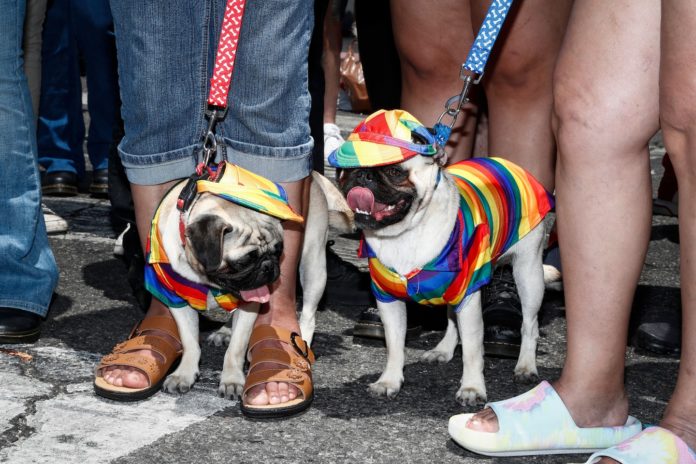
This is not to say gay life in America is all rainbows. Many LGBTQ youths still face homelessness and are drawn to the false, cruel consolation of suicide. In redder parts of the country, school libraries are targeted for carrying LGBTQ literature. And middle America seems largely unreconciled to conceptions of gender that involve prepubescent medical intervention.
Yet most people now regard the equal treatment of gay people as a minimal commitment of a just society. In 1996, only 27 percent of Americans supported same-sex marriage. But this has changed in group after group. In 2016, for the first time, a majority of adults 65 and older said they supported same-sex marriage. The same became true of a majority of Protestants in 2017 and of Republicans in 2021. Weekly church attenders remain the most resistant category. But even among this group, 40 percent approve of gay marriage. Overall support among Americans now exceeds 70 percent.
This is a battle in the culture war that was never fully joined. After the Supreme Court’s Obergefell v. Hodges decision in 2015 legalizing same-sex marriage nationwide, few politicians — including social conservatives — seemed eager to revisit the issue. And it is hard to imagine that even a conservative Supreme Court majority would want to challenge such a decisive U.S. majority.
Consider the contrast to abortion politics, where a Supreme Court decision in 1973 set off one of the most durable struggles in American public life. Why have these two examples of social controversy worked out so differently?
Perhaps the strongest reason is the simplest. The argument over abortion involves conflicting perspectives on human rights — one that emphasizes the autonomy of women, the other that emphasizes the value of nascent human life. It is a fundamental clash of visions that often ends in bitterness and the questioning of motives.
In the conflict over gay rights, supporters have asserted a compelling view of human dignity, while opponents have struggled to explain how broadening rights harms others. The advance of same-sex marriage, it seems, has generally ended in cake and dancing.
Some conservatives claimed that gay marriage would somehow weaken the institution of straight marriage. But the evidence that same-sex marriage increases rates of divorce, child poverty or children living in single-parent homes appears nonexistent. (A decline in family stability in the United States has caused harm to children, but its roots long predate same-sex marriage.)
A second reason for gay rights’ rapid solidification as a core American value is an implication of genetics. Though there seems to be no single “gay gene,” scientists in the field generally affirm a role for genetics in the determination of sexual orientation. And imposing social or legal disadvantages on individuals for an unchosen disposition seems a violation of basic fairness.
The claim by some social conservatives that a genetic tendency toward homosexuality doesn’t make it moral — any more than a genetic tendency toward violence or crime makes them permissible — strikes me as tendentious. There is a wide ethical difference between the felonious theft of life or property and the sexual activities of LGBTQ people that are roughly equivalent to those of their heterosexual counterparts. We ask everyone to refrain from assault and robbery; opponents of homosexuality would have only one group refrain from sex.
Third, opposition to same-sex marriage seems less religious than generational. Half a century ago, leaders could simply count on a general social uneasiness about people who are gay. Such discomfort now cannot be assumed, particularly among the young. Opponents of gay rights are forced to argue directly for their views — which must feel intolerant while emerging from their mouths.
Among religious young people, certain questions are growing more insistent: Why should we assess homosexuality according to Old Testament law that also advocates the stoning of children who disobey their parents? Isn’t it possible that the Apostle Paul’s views on homosexuality reflected the standards of his own time, rather than the views of Jesus, who never mentioned the topic? There is little wonder that, according to a Pew Research Center poll, over half of White evangelicals 50 and older oppose gay marriage while over half of those under 50 years old in the same group support gay marriage.
It is still possible for the gay rights movement to destructively overreach — as in denying the right of religious schools and charities to shape their own institutional standards. But in the meantime, I’m up for some Pride bocce.








